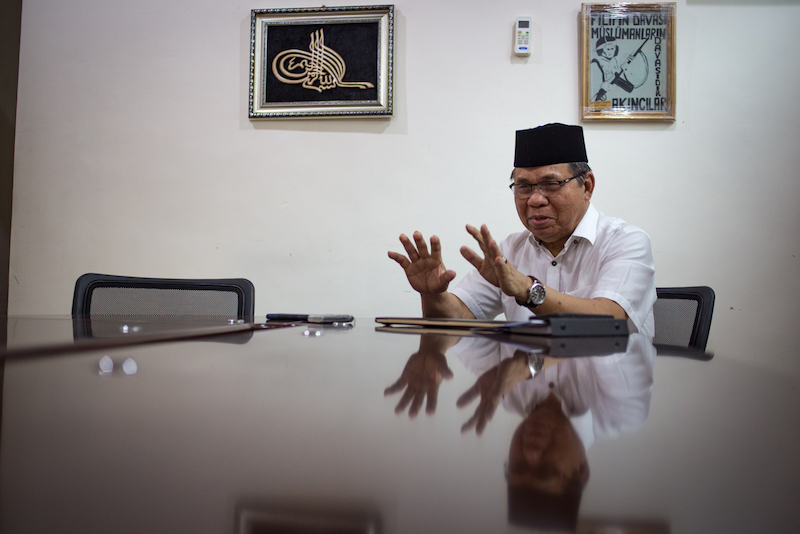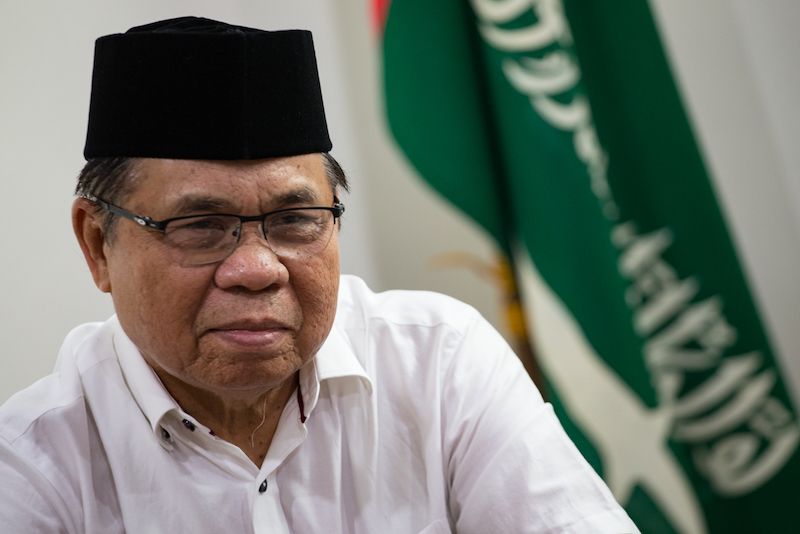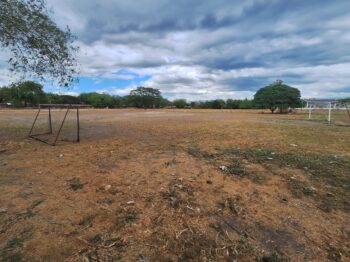CAMP DARAPANAN, Sultan Kudarat, Maguindanao (08 June) — The chair of the Moro Islamic LIberation Front (MILF) has acknowledged that the versions of the Bangsamoro Basic Law (BBL) passed by the Senate and House of Representatives last week are “very diluted” and may create a Bangsamoro political entity that will be less autonomous than the Autonomous Region in Muslim Mindanao (ARMM) but hopes to regain the provisions they lost during the Bicameral Conference Committee (bicam) that will meet on July 9 to 13.
In a sit-down interview at the conference room of the MILF Central Committee conference hall here late Thursday afternoon, MILF chair Al Haj Murad Ebrahim said they will “exert all efforts” and decide after the final version comes out, what their option will be, in consultation with the Moro people, if they will accept or reject it.
“Always the process of the MILF is we will consult our people so maybe before we accept, we will conduct consultation,” he said, noting that “even if we accept it, if the people don’t accept it, don’t support us, then we cannot do much if the people will not support us,” he added.
 Al Haj Murad Ebrahim, chair of the Moro Islamic Liberation Front, talks about the Bangsamoro Basic Law versions that the House of Representatives and the Senate passed last week in a sit-down interview with MindaNews late Thursday afternoon, June 7, 2018, in the MILF’s Camp Darapanan, Sultan Kudarat in Maguindanao. MindaNews photo by MANMAN DEJETO
Al Haj Murad Ebrahim, chair of the Moro Islamic Liberation Front, talks about the Bangsamoro Basic Law versions that the House of Representatives and the Senate passed last week in a sit-down interview with MindaNews late Thursday afternoon, June 7, 2018, in the MILF’s Camp Darapanan, Sultan Kudarat in Maguindanao. MindaNews photo by MANMAN DEJETO
Murad explained that if the versions are not changed or improved during the bicam, then the final version will be one that is “partially compliant, partially non-compliant to the agreement,” refering to the Comprehensive Agreement on the Bangsamoro (CAB) that the government and MILF signed in March 2014.
“So now we have to decide … what will be the bigger advantage for the Bangsamoro people, for our struggle?” he said.
He explained they will analyze the impact and consequences of their decision on the final version of the Bangsamoro law.
“Tingnan namin.. kung hindi namin tatanggapin, anong mangyayari? Kung tatanggapin namin, ano rin ang mangyayari? (We will see .. if we do not accept, what will happen? If we accept, what will happen?). Now, alam natin that the BBL is intended to solve not only one problem but multifaceted problems. Maraming problema kailangang i-address now, how .. will this BBL that will be passed .. become instrumental in solving these problems? So basically ang decision namin will lie on how much the BBL can address the problem that we are confronting.”
“Substantially watered down”
He noted there are many provisions in the ARMM law that are not in the BBL versions although there are also provisions in the BBL that are not in the ARMM.
The BBL is supposed to be the enabling law of the CAB, to pave the way for the creation of a new autonomous political entity that would replace the now 28-year old ARMM, a region autonomous in name but lacking in fiscal autonomy, among others. The ARMM had earlier been referred to as “a failed experiment.”
Murad added there are many provisions in the BBL that were changed which “resulted to violation of the (CAB)” and new provisions introduced that were not in the agreement or the ARMM but which “substantially watered down yung concept, the very concept of self-determination.”
Asked to cite unacceptable provisions, Murad replied: “marami talaga (so many) because if you look at the versions, makita mo na napakaraming napalitan” (you will see so many changes).
He said they had a meeting with the Central Committee two days earlier where they made a collegial decision to “exert all efforts” during the bicam (then afterwards … we will decide.”
Murad said there are provisions where the Senate and House versions differ “so ang tingin namin pwede pang doon maibalik sa dati” (so we think what we lost may be restored there) “if both houses agree.”
“We recognize the reality na… the struggle is still ongoing sa aming side, we will still try our best na ma-regain whatever is lost dito sa BBL,” Murad said, adding they will “exhaust all avenues” and that aside from bringing their concern with the President. “we will also bring up our concerns with the leadership of the Senate and leadership of the House.”
Between now and July 9, the start of the bicam meeting, Murad said they will “lobbywith the leadership of the house (and senate) then also individual lawmakers” on concerns about the watered down version. He said they would present the matrix showing the versions drafted by the BTC, the House and the Senate.
The bicam, composed of 28 legislators – 18 from the House and 10 from the Senate – is tasked to “settle, reconcile or thresh out differences or disagreements on any provision of the bill.” A number of the members introduced amendments to the BBL in the House and Senate.
“Exert all efforts”
Murad recalled they met with President Duterte at the Matina Enclaves in Davao City on May 4 where they raised their concerns about “many provisions being diluted or amended or taken out.”
The President, he said, told them he would meet the Senate and House leaders. That meeting happened on May 28, the President meeting with the MILF first, followed by his meeting with the House leadership and a separate meeting with the Senate leadership, and finally a meeting with the leadership of both houses.
 Al Haj Murad Ebrahim, chair of the Moro Islamic Liberation Front, acknowledges in a sit-down interview late Thursay afternoon, June 7, 2018, in the MILF’s Camp Darapanan, Sultan Kudarat in Maguindanao. that that Bangsamoro Basic Law versions that the House of Representatives and the Senate passed last week is “very diluted” but hopes something can still be done at the level of the Bicameral Conference Committee that will meet on July 9 to 13. MindaNews photo by MANMAN DEJETO
Al Haj Murad Ebrahim, chair of the Moro Islamic Liberation Front, acknowledges in a sit-down interview late Thursay afternoon, June 7, 2018, in the MILF’s Camp Darapanan, Sultan Kudarat in Maguindanao. that that Bangsamoro Basic Law versions that the House of Representatives and the Senate passed last week is “very diluted” but hopes something can still be done at the level of the Bicameral Conference Committee that will meet on July 9 to 13. MindaNews photo by MANMAN DEJETO
Murad said they again expressed to the President their apprehensions over the proposed House and Senate amendments to the BBL drafted by the Bangsamoro Transition Commission (BTC). He said they told the President “very concerned kami sa ipapasa ng House at Senate. Parang masyadong maraming amendments, maraming deletions, maraming revisions” (we are very concerned about what the House and Senate would pass beccause there is so many amendments, many deletions, many revisions).
Between now and July 9, the start of the bicam meeting, Murad said they will “lobbywith the leadership of the house (and senate) then also individual lawmakers” and present to them their concerns about the watered down version.
He said they would present the matrix showing the versions drafted by the BTC, the House and the Senate that clearly shows the “maraming amendments, maraming deletions, maraming revisions.”
At the signing of the CAB on March 27, 2014, Murad spoke of the celebration of the “shared victory of the Bangsamoro and the Filipino people” as the CAB, he stressed, “finally brings with it the restoration of the identity, powers and resources of the Bangsamoro. These three things which have been ours since time immemorial, unjustly taken through colonization and occupation, are now returned to us.”
How much of what was returned to them through the peace agreement — the “restoration of the identity, powers and resources of the Bangsamoro” — was lost in the approved BBL versions?
“Well, hindi naman sa completely lost but kung titingnan mo, it is .. maybe very diluted na talaga. Very diluted,” he said. (Carolyn O. Arguillas / MindaNews)
